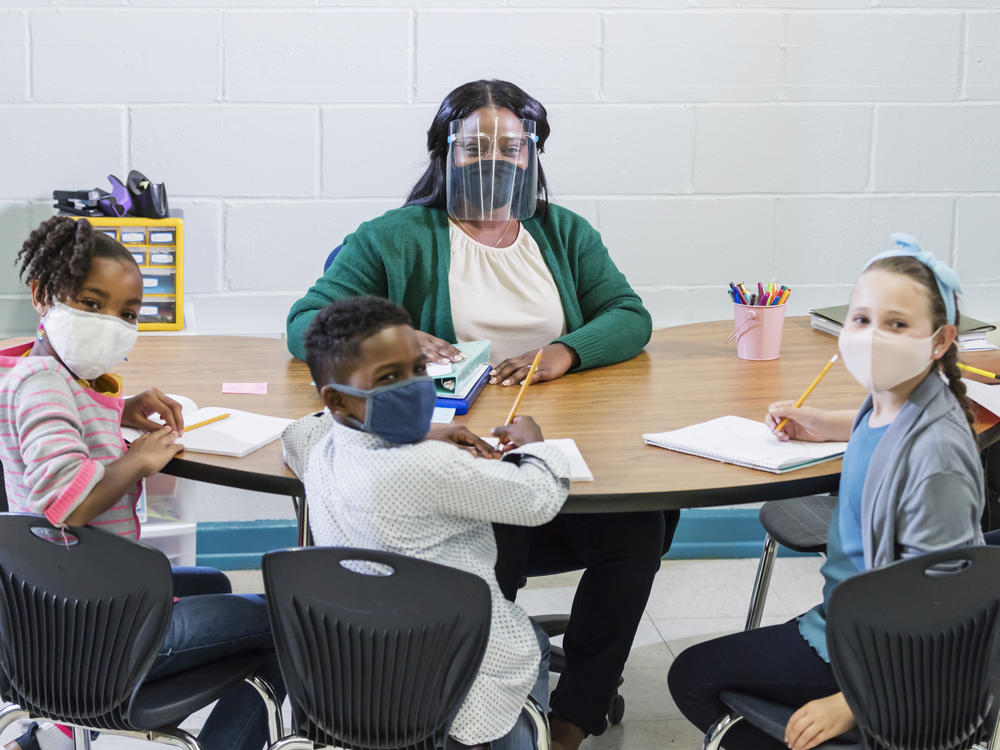Section Branding
Header Content
Yes, Gov. DeSantis, Studies Do Show Masks Curb Covid-19 In Schools
Primary Content
From a political and legal standpoint, the battle over whether mask wearing should be enforced in schools is still raging. But from a scientific standpoint, there's little debate: Masks really do help curb the spread of the coronavirus in school.
While there are still some non-believers ...
This week, a spokesperson for Florida Gov. Ron DeSantis was asked to comment on a lawsuit challenging Florida's ban on mask mandates in school. The spokesperson told NPR, "The assertion that forced-masking all children ages 2 and up has any impact on school safety vis-a-vis COVID-19 is not data-driven and is not reflective of a scientific consensus." Montana Gov. Greg Gianforte expressed similar doubt last week. He called existing research "inconclusive" and announced a new rule that encourages schools to give parents the final word on whether their kids don masks.
... the research is conclusive
Several studies over the past year have shown that widespread masking can significantly curb transmission from student to student.
For example, one study in Wood County, Wisconsin, last fall found that schools that required masking had a whopping 37 percent lower incidence of COVID-19 than the surrounding community. Another study, conducted in Salt Lake County, Utah, last winter, found that high levels of mask wearing among students helped keep the rate of in-school spread of the coronavirus to under 1% — even as COVID-19 cases were surging in the wider community.
Now, in all those examples, schools were also using other protective strategies that experts strongly recommend layering on — like physical distancing and opening windows.
But studies show that even in situations where these other measures aren't being used, masking makes a big difference in keeping the virus from spreading. That was one conclusion of the ABC Science Collaborative, a major research initiative involving nearly 1 million students from 100 school districts and 14 charter school in North Carolina. It found that universal masking policies helped keep transmission rates of the coronavirus within schools to under 1% last fall and spring.
"The science clearly shows us that masking is an effective strategy to prevent within-school transmission when COVID-19 is circulating and when vaccination is not yet available for all children," Dr. Kanecia Zimmerman, co-chair of the ABC Science Collaborative, said in a statement reviewing those findings.
Even with the delta variant, within-school spread is low
Now, most of those studies were conducted before the highly contagious delta variant began its current sweep across the U.S. But unpublished data, gathered during this past summer school session in North Carolina, shows that transmission was indeed a bit higher as delta spread in the surrounding communities. But even then, thanks to universal masking and other mitigation strategies, the rate of within-school spread was under 3%, says Dr. Ibukun Kalu, a pediatric infectious disease specialist at Duke and also a member of the ABC Science Collaborative research team.
But, again, proper masking is key
Not masking could be disastrous for schools, says Julie Swann, a department head and professor at North Carolina State University who leads a COVID-19 forecasting team funded by the Centers for Disease Control and Prevention.
According to a recent modeling study from Swann's lab, without masking policies or other interventions in place, within the first three months of school, the delta variant could infect more than 75 percent of susceptible kids – those who aren't vaccinated and haven't previously had a bout of COVID-19.
"It's shocking, right?" Swann says. "And I'm the parent of two school-age [children]."
Swann says her model's projection represents "pretty close to a worst-case scenario" – a situation where kids are wearing ill-fitting masks that don't filter well, and mask wearing isn't reliably enforced. But, it doesn't have to be that way.
With proper masking and other interventions in place, she says, schools may still see some outbreaks because of delta's highly infectious nature, but far fewer than they would otherwise.
Copyright 2021 NPR. To see more, visit https://www.npr.org.

